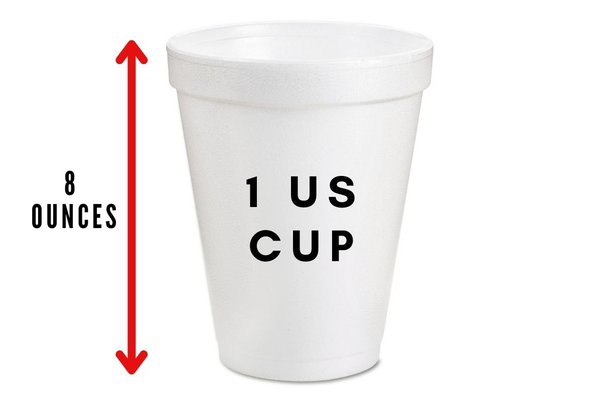Unveiling the Mystery: How Many Cups are in a Glass of Water?
When it comes to hydration and proper fluid intake, one common question that often arises is, "How many cups are in a glass of water?" While it might seem like a simple query, the answer can be surprisingly complex and vary depending on different factors. In this article, we will delve into this question, exploring the variations, measurements, and considerations surrounding the volume of water in a glass.
I. Understanding Standard Measurements:
Before we dive into the specifics, let's establish some standard measurements. In most culinary contexts, a standard glass of water is often considered to be 8 ounces, which equals one cup.

8 ounces
This standard provides a convenient baseline for discussions related to water consumption. However, real-world scenarios are rarely this straightforward.
II. Varied Glass Sizes:
Glass sizes can vary significantly, affecting the answer to our question. Different types of glasses, such as short glasses, tall glasses, tumblers, and even stemware, can hold varying amounts of water. Thus, the number of cups in a glass can range from half a cup to several cups, depending on the glass's capacity.
III. Factors Affecting Glass Capacity:
Numerous factors influence the capacity of a glass, leading to variations in the number of cups it can hold. These factors include the glass's shape, height, width, and even the material it's made from. A taller and narrower glass might hold less water than a shorter, wider glass with the same volume measurement.

Varied Glass Sizes
IV. Conversion to Metric Measurements:
For those accustomed to metric measurements, understanding cups and ounces might be a bit confusing. One cup is roughly equivalent to 240 milliliters. Therefore, if a glass holds 240 milliliters of water, it can be considered as one cup. This conversion is important, especially in international contexts where metric measurements are more commonly used.
V. Importance of Precision:
In scenarios where precise measurements matter, such as in scientific research or medical recommendations, relying solely on cups as a unit might not be sufficient. Measuring water by weight or milliliters could provide more accurate and consistent results. This precision becomes crucial when determining daily water intake requirements for health and hydration.
VI. Daily Hydration Needs:
The discussion about how many cups are in a glass of water is often tied to the broader conversation about daily hydration needs. Health experts commonly recommend consuming around 8 cups (approximately 2 liters) of water per day.

Daily Hydration Needs
However, this guideline isn't solely tied to standard cups or glasses; it's more about maintaining a consistent level of hydration for overall well-being.
VII. Adjusting for Individual Factors:
It's essential to note that individual hydration needs can vary based on factors such as age, weight, activity level, and climate. Someone who leads an active lifestyle in a hot climate might need more water than someone who is sedentary and lives in a cooler environment. Therefore, focusing solely on the number of cups can overlook these critical individual considerations.
VIII. Practical Tips for Hydration:
Rather than fixating on the exact number of cups in a glass of water, it's more practical to cultivate good hydration habits. Keeping a reusable water bottle with you throughout the day can serve as a constant reminder to drink water regularly.
Monitoring the color of your urine can also provide insights into your hydration status – pale yellow is generally a good indicator of adequate hydration.
IX. Conclusion:
In conclusion, the question "How many cups are in a glass of water?" might not have a straightforward answer due to the variability in glass sizes, shapes, and individual hydration needs. While the standard 8-ounce glass serves as a convenient reference point, it's important to focus on overall hydration and develop habits that ensure you're getting enough water to support your well-being.
So, whether it's a small tumbler or a large mug, what truly matters is staying hydrated for a healthier life.